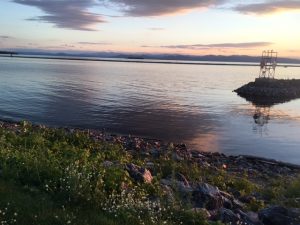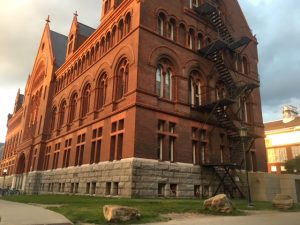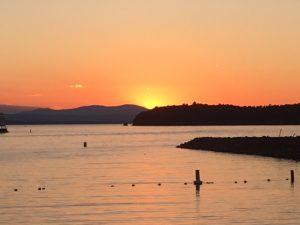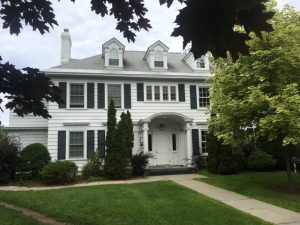This article is more than 5 years old.

What is Immersion?
From July 24-29th I visited Burlington, Vermont to attend Immersion, a week-long, intensive training for librarians working on information literacy. Immersion was located on the campus of Champlain College. I attended the “Teacher Track,” which is ideal for early-career instruction librarians who are interested in strengthening their knowledge of instructional techniques and theory. Here were some of my key takeaways:
Transformative Learning
We began the week by considering information literacy through the perspective of “GeST Windows.” In this model, learning outcomes (as in, what we hope students learn) are seen as fitting into one of three categories:
- Generic – skills-based (e.g. search strategies for library databases)
- Situational – situated within an authentic social/cultural context (e.g. giving correct attribution for a Creative Commons image in a blog post), or
- Transformative – transforms oneself or society (e.g. writing a social critique that challenges the status quo/questions assumptions)
These perspectives are hierarchical, and (I think) they can be in tension with one another. For those like myself, who have both the time and the desire to focus on the transformative, it’s still all too easy to default to teaching only “generic skills,” rather than engaging in the difficult work of teaching ideas that might be transformative for the student. However, generic skills are still essential, and I think it is important not to negate the very real benefits that “generic skills” can have for our students.

Learning to “Unlearn”
Perhaps my favorite “tidbit” of the week is the notion that a big part of learning is un-learning the things that we think we know. We began by learning about assumptions — particularly our own assumptions, which can be hard to uncover because often we don’t know that we are making them. We grouped assumptions into three types, based on Brookfield’s Becoming a Critically Reflective Teacher:
- Causal Assumptions – an assumption about how something (like learning) works, and how to change it (e.g. making a mistake in front of students increases their trust in us). These are considered the easiest to uncover
- Prescriptive Assumptions – an assumption about how we think something should be (e.g. What does a good teacher do?) These are often extensions of paradigmatic assumptions
- Paradigmatic Assumptions – these are the hardest to identify, as to us they appear to be things that we know to be true, and deal with the way that we have ordered the world into fundamental categories (e.g. “adults are self-directed learners”)
So, we had a great activity in which we attempted to uncover our assumptions about our students (e.g. what do we “know” about our students vs. what we “think” we know). So, an assumption I’ve been known to have about Wake students is that they are generally well-prepared, academically speaking, for college. I’ve met a few students who have challenged that assumption, but it’s one that I know I hold and it directly relates to my classroom and instruction. Recognizing these assumptions, or having a critically reflective awareness of them, is important for furthering student-centered learning.

The Neoliberal Library Classroom
Immersion came at an interesting time. This summer, there has been a bit of controversy in the information literacy world over ACRL rescinding the Information Literacy Competency Standards in favor of the new Information Literacy Framework for Higher Education.
There have been a variety of different responses to this action, ranging from hurt to happiness to apathy. I like both documents, I find them both helpful, and I will continue to use both, but neither are the end-all-be-all for information literacy.
One of the smartest and more interesting responses I read was Emily Drabinski’s blog post What Standards Do and What They Don’t. It echoed many of Drabinski’s thoughts from Towards a Kairos of Library Instruction, which we discussed at Immersion. Essentially, both articles question our assumptions (there they are again!) about “standards” (and frameworks, for that matter) and what they do (e.g. create professional identity, allow us to bargain for resources) and don’t do (e.g. reveal “the truth” of information literacy, tell us how to teach/what to teach in our classrooms).
In the Kairos article in particular, Drabinski reminds us of what brought about our desire to create professional standards in the first place – an increasing notion that a liberal arts education be tied directly to employment/job-preparedness. Because of this, the “about-ness” of information literacy became defined by a set of skills meant to help students in the workforce. Drabinski reminds us that the focus of instruction should be, “on the particular students in a particular classroom with a particular set of learning experiences and needs” not defined by a list of frames or standards.
I think these ideas have been particularly revelatory (and dare I say, transformative) for me and my instructional practice. I’m super pumped to consider all of these ideas as I continue to revise LIB100 moving forward.

Learning Outcomes, Peer Observation, Assessment, Oh, my!
We also spent a lot of time on the bread and butter of good instructional practice — learning outcomes, assessment, incorporating technology, peer observation. I can’t claim to be an expert in any of these areas, but I’m happy to share what I learned.
I will say Immersion served as a nice reminder to not backslide into poor instructional habits (“Lesson plan? I’ve taught this lesson over 30 times! I know what I’m doing!”). See those assumptions? It definitely inspired me to write learning outcomes for each and every lesson this semester, especially since I’m making a pretty big change by having my students create Wikipedia articles. So, thank you Immersion!
Everything Else
Burlington, Vermont was a neat town. The weather was amazing. The town was very walk-able and you can see Lake Champlain and the Adirondacks from just about anywhere. There’s also a lot of beer and ice cream, so, what else do you need to hear, really?
I could talk about Immersion for days. And I did, apparently. If you made it this far, I owe you a Heady Topper! (If it can be found!)


11 Comments on ‘Amanda at Immersion 2016’
Don’t mind me; I’m just adding every single reading you mention to my Instapaper account…
I’m glad you had such a reflective and re-energizing Immersion experience!
It sounds like you had a very worthwhile immersion!
Thanks so much for sharing! Such a beautiful location–perfect for inspiration and reflection. I am grateful to ZSR for giving you the opportunity to participate in Immersion. I am most excited about the “Towards a Kairos of Library Instruction” article!! I have printed it as well as the blog.
Welcome back! Can’t wait to hear more!!
Such a fun and inspiring blog post, Amanda! Thanks for sharing it. In my job I don’t have to think to much about instruction or frames or ACRL learning standards, but I’m glad that you do and you do it so well.
Congrats! So glad it was inspiring for you. Thanks for sharing! Would love to chat later more about it.
Informative and picturesque.
I need to buy you a drink at Starbucks and hear all about Immersion! Thanks for posting!
Sounds like an incredibly beneficial week. I particularly like situational and transformative windows, and checking assumptions. Those fit with my narrow instruction subjects. Interesting!
I can feel how inspired you feel just from reading your post!
They do such a great job with this program -glad you had such a great experience with it!
Roz
Glad the trip and week away was so enlightening. Sounds delicious as well as really useful for your professional responsibilities. And fire escapes are scary so brava!